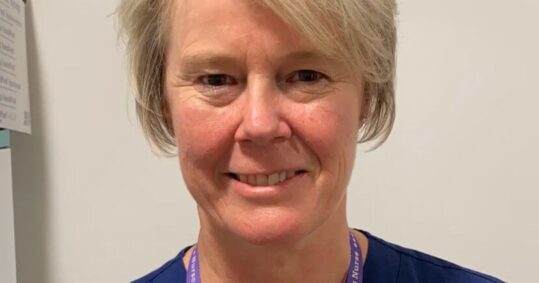GPNs well placed to support ‘silently struggling’ veterans

A general practice nurse (GPN) who helped save a veteran patient’s life and marriage has told how the profession and sector are well placed to help identify and support those who may be ‘silently struggling’ with their mental and physical health.
As Remembrance Day approaches, Queen’s Nurse Helen Hurst is among those encouraging nurses and their GP practices to become Veteran Friendly Accredited to help better support the health needs of veterans.
The scheme, developed by the Royal College of GPs and NHS England, is a free programme that provides practice teams with a ‘simple process’ for identifying, understanding and supporting veterans.
More than 2,300 GP practices are already signed up and, according to NHS England, over 77% of primary care networks (PCNs) have at least one GP practice in their area accredited.
Ms Hurst told Nursing in Practice how GPNs were vital in supporting veterans, especially as they were ‘very good about making every [patient] contact count’.
Related Article: NHS 10-year plan: What does it mean for nursing?
While GPNs may sometimes be seen as the ‘lost and forgotten out in the community’ they were ‘great at making change’, she added.
One of her veteran patients, Jon Lynn, credits Ms Hurst and her Veteran Friendly practice with saving his life and marriage.
‘Leaving the military was an incredibly difficult decision for me, I didn’t know what to expect when I left and, in my first year outside of the Armed Forces, I struggled with my mental health,’ said Mr Lynn.
‘I eventually sought support and was surprised and grateful to be asked by Helen and her team if I was a veteran – they clearly understood that I may be suffering from issues that were different to other patients.’
He explained he was then referred through ‘priority specialist services’ and diagnosed with PTSD and ‘provided with help and support in order to confront and manage my condition’. Mr Lynn was also referred to a specialist centre in London for a physical injury he sustained during service.
Without his practice being accredited, Mr Lynn said he would ‘never have known’ about the specialist help out there for him or ‘received the high quality mental and physical support that I did’.
Following the support he received from Ms Hurst and others, Mr Lynn said he now has a ‘toolbox of techniques to help me deal with the issues I have as a result of my service’.
Ms Hurst, who identified that Mr Lynn was a veteran when he came for an appointment for something else, said hearing his feedback made her emotional.
‘I just feel that when people tell me that I have made a difference as a nurse, that I know I’ve then done my job,’ she told Nursing in Practice.
Related Article: Funded nurse workforce plan needed for neighbourhood health services
Separately, Dr Emily Brookes, the RCGP’s veterans clinical champion, said: ‘This Remembrance Day, I would encourage all practices to sign up to become Veteran Friendly in order to support their patients who have served in the Armed Forces.
‘Through taking this quick and easy step, practices can gain access to a range of training, resources and guidance that can be used to make a real difference to the way they identify, support and refer their veteran patients, saving time and improving health outcomes.’
Meanwhile, NHS England director of health and justice and Armed Forces, Kate Davies, said: ‘Remembrance Day is an opportunity to express our gratitude to those who have bravely fought for our country as well as reminding them that there is always help available.
‘The NHS is dedicated to improving the health and wellbeing of the Armed Forces community by making sure every veteran gets the best possible care.’
She noted that NHS England made a commitment in 2021 to provide an additional £18m for veteran services over three years.
Research suggests that many veterans may be reluctant to seek help from healthcare professionals, particularly if they feel they will not be understood.
Related Article: Over one million children living in homes causing asthma and chronic illness
For example, less than half (49%) of those who experience a mental health issue typically seek formal medical support. Yet, those who delay seeking support report an increase in suicidal thoughts.
In addition, while the average GP practice sees a veteran patient every day, around half (47%) of practices may be unaware of how many of their patients are veterans.
A version of this article first appeared in our sister publication Management in Practice

See how our symptom tool can help you make better sense of patient presentations
Click here to search a symptom




